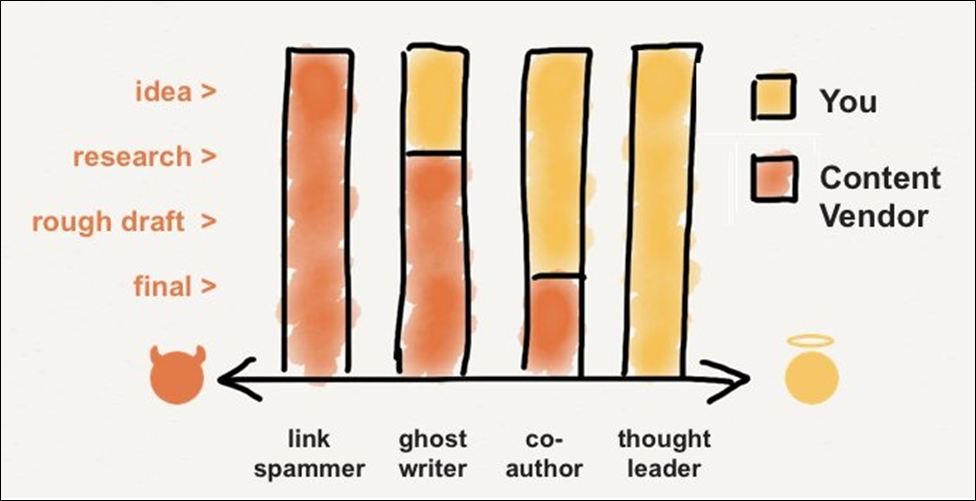By {grow} Community Member Andy Crestodina
Blogging is work. Finding time is hard, and pushing back deadlines isn’t easy. 29% of B2B marketers report that “producing enough content” is a challenge (source: B2B Marketing Survey). So why not outsource it?
Great! Let someone else do the work. But delegators beware. Ethical issues pop up when you outsource your blogging, especially when the goal is SEO. As usual, search is on the front lines of marketing ethics.
The ethics of outsourcing content isn’t black and white. There’s a spectrum of SEO ethics, ranging from the easy (but shady) to the difficult (but pure).
Link Spammers
The last few years have been tough for SEOs, especially those who relied on link networks, article spinning, and directory submissions to build links. Google’s rank-crushing (but cute-sounding) algorithm updates, “Panda” and “Penguin,” changed everything. So SEOs turned to guest blogging as a reliable, repeatable way to build links to client websites.
But when the search pros start writing, things get weird. For the first time, clients are able to review the work and not just the rank. They want to read the content for which they paid. And since SEOs care more about the links than the writing, the quality of the writing is low. All too often, the content and the host blog look suspiciously irrelevant, even if they are good for rankings.
It’s unethical because the writer doesn’t care about the writing. In fact, they don’t care if the content is ever seen by human eyes. All that matters is GoogleBot and the juice that the link provides.
The Ghost Writer
The next step on the spectrum is the ghost writer. Since the idea for the content actually originates from you, it’s more legitimate. In this case, you write the topic sentence, the opening paragraph, and/or an outline.
Yes, it takes time to discuss topics, but the SEO vendor does most of the work, researching the topic, finding host blogs, writing, and editing. In the end, they may put your name on it, which is where ethics come into play. The topic is yours, but not the tone. Although it’s not written in your voice, you’re signing your name to it.
The Co-Author
This approach is a true collaboration between you and the SEO partner. You know the industry, so you provide the ideas, but you also do the research and write the first draft. The quality is higher, but quality takes time. The post is two-thirds done when you hand it off.
The SEOs do the editing and optimizing. They’re good at this because they know how to research keywords and SEO best practices. They also know (hopefully) where and how to pitch the piece as a guest post.
In the end, it might make sense to give writing credits to both authors. But only one can get credit in Google as the author. Google Authorship doesn’t allow for more than one author. If you want full social media benefit, put the rel=”author” tag on the link to your own Google+ profile.
Thought Leaders
You know the subject. You know your audience. You care the most. This means you have the best opportunity to find the right topic and shape it with your voice. Through your content, you can become respected for your ideas. That’s what a thought leader is.
It’s the highest quality content. It’s the well-researched articles, the passionate op-eds, the detailed reference guides. This is time-consuming, “cornerstone” content. Not the kind of thing you write everyday.
As a thought leader, you’ll get all the social benefits: a growing following, better traffic through sharing, and new connections. You’ll be an author in the eyes of Google (you’re ready for Authorship and Author Rank) and in the eyes of your peers (you may end up getting invitations to speak at events).
The trick is to find the time…
Take the high road (or the highest road possible)
No one likes a link spammer. So go as far to the right of the chart as time will allow. I suggest combining your options.
- Be a thought leader …when you can. Set aside time to write every week. If inspiration strikes, carry the idea all the way through to completion. Let your SEO or marketing partner help you promote it. If you don’t manage to finish the piece…
- Leverage your SEO partners …but collaborate. Leverage your own time by sharing ideas, information, and connections with them. Let them finish the work so you can keep the content wheels turning.
I’m sure you’ve got a few thoughts by now. What do you think? Should SEOs even try to create content? Will brands ever find the time to write? I’m looking forward to the comments on this one…

Top image courtesy BigStock.com




